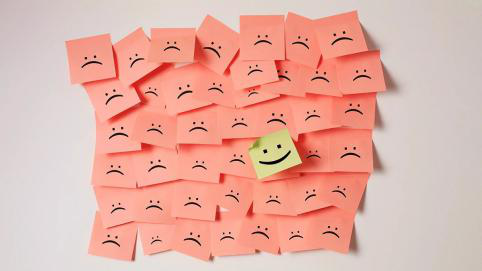
Unhappy at work, you may fall into these three traps
Over the years, we have heard many cases of employee engagement and boredom. So why do so many people accept unsatisfactory work, great pressure, and long-standing pain?
Why not resist? It is not all external factors that cause the disease of this era, but also our own reasons. Many people fall into the “happiness trap”, trapped in a harmful mentality and work style, feel pain, and ultimately affect their career development.
There are three most common “happiness traps”: ambition, what should be done, and working too hard. These three factors may seem beneficial, but they will have negative effects when they go to extremes.

Ambition trap
The ambition to achieve our goals and develop our careers prompted us to go all out. However, if you are in a highly competitive environment and are dedicated to the pursuit of victory, problems may arise.
We will become ignorant of the impact of our actions and harm our relationships and cooperation. We began to blindly pursue our goals, and our work gradually lost its meaning.
There is certainly nothing wrong with ambition.
Sometimes this can prompt people to hone their social skills. After all, effective cooperation is a prerequisite for long-term success in a complex organization. But letting go of one’s ambitions and focusing solely on personal goals will lose the trust and help of colleagues, make work fall into unhappiness, and eventually lead to both professional and personal derailment.

The “things to do” trap
Do what we think we should do, not what we want to do. We are easy to fall into this trap in our daily work. Some unwritten rules that shape our careers are indeed good, such as paying back to the family after completing school, and being punctual and polite at work. But there are too many “should be done” in the workplace, forcing us to deny ourselves and make choices that hinder our potential and stifle our dreams.
To be successful at work, most people in companies must follow the “should be done”: dress, talk, socialize and even spare time. Such “hidden rules” have no basis (gender, race, and marital status have nothing to do with leadership), and will have a bad effect on individuals, making us feel that we must hide ourselves and pretend to be something else.

What we should do not only affect our performance at work, but also often determines what kind of work and career we pursue. Take Marcus, another client I mentored as an example. He participated in several entrepreneurial ventures in the last two years of college. He liked that experience and hopes to continue to develop in entrepreneurship.
However, as he approached graduation, he began to waver and later accepted a position in a well-known consulting company. After working for 6 months, he realized that he hated the job, but his parents were still proud of his good job and high salary.
Friends asked him to recommend him and he felt unable to resign. At the age of 42, Marcus became a partner in the company. He obeys all the rules and is a successful man on the surface. But this is the problem: his career is like a game.
Avoiding the “should be done” trap certainly does not mean completely ignoring the regulations. There are no rules at all, and with cultural deviations, even more inclusive organizations will have problems.
We must recognize what kind of regulations will have a negative impact. Repressing ourselves and striving to conform to the crowd prevents us from giving full play to our original creativity in our work, nor can we work happily, and happiness is the key to long-term career success.
Overwork trap
Some people respond to the stress of “always on” work in the 21st century by spending all their waking time at work, or thinking about work. We have no time for friends, exercise, healthy food and sleep, no time to accompany our children, or even listen to them.
We are sick and do not rest at home. We don’t have time to get to know our colleagues, and we can’t consider others before making a decision.
Overwork makes us fall into a vicious circle: more work brings more stress, stress affects thinking ability and emotional intelligence, creativity and interpersonal skills decrease, and affect our ability to complete work.
Many workplaces still promote overwork, which makes this approach very tempting. Erin Reid of Boston University discovered that some people (especially men) lied about their working hours.
They claim to work more than 80 hours a week, probably because they feel that working for long hours can make their boss happy. In addition, being addicted to work can eliminate insecurities, less guilt when seeing other people overwork, and it can also allow us to avoid personal problems.
Many people who overwork believe that work can relieve stress. After completing projects, writing reports, and reading emails, their sense of loss of control will decrease. However, the work is endless.
Whether you fall into the trap of “should be done” and overwork like Marcus, or trapped in ambition, what you have to consider is how to get rid of it. There are some management skills and thinking that can help you improve efficiency at work, and can also help you get rid of traps and find happiness again.

Free yourself
First of all, we must accept the concept: happy work is what you deserve. Discard the misconception that “work is not the main source of satisfaction”. For centuries, work was merely a means of making a living.
Many people still work in extremely harsh environments with low salaries, and work is a chore for them. But research shows that heavy work with meager pay can also provide satisfaction.
Surprisingly, successful executives, today’s knowledge workers and creative workers, sometimes fail to find real meaning in their work and regard work as torture.
Work can provide happiness. I define it as the deep and lasting pleasure of daily activities, derived from meaningful goals, a promising future, and the enthusiasm of genuine friendship.
Using emotional intelligence to remove happiness barriers is the first step in obtaining satisfaction at work. But happiness does not fall from the sky. We must take the initiative to find meaning and goals in our work day after day, cultivate hope for ourselves and others, and build friendship at work.

Too many people think that if they can succeed, they can be happy. The fact is just the opposite. Psychology researcher and writer Shawn Achor put it bluntly: “Happiness comes first than success.” Because the positive emotions brought about by the devotion, satisfaction, and sense of value at work have many benefits: it makes the brain better.
Play a good role, improve creativity and adaptability; make us more energetic, make smarter decisions, and better deal with complex situations. The principle is simple: happy people perform better than unhappy people.
It’s time to demand the right to work happily. First, let us re-understand what we should expect from work and others. Let us get rid of the unhappiness trap. Let us begin a journey of seeking happiness and satisfaction, concentrating on finding and practicing our goals at work, pursuing an attractive future, and turning colleagues into true friends.
These few elements will help us build a humanistic working environment, make people respect each other and achieve sustainable success. In such a working environment, creativity, needs, and desires are important, as are happiness.
Comments